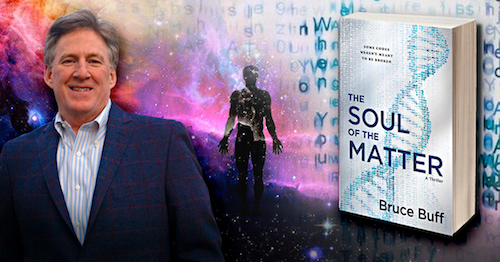 Culture & Ethics
Culture & Ethics
 Evolution
Evolution
 Faith & Science
Faith & Science
 Intelligent Design
Intelligent Design
A Flash of Insight About Physics, Reality, and DNA Launched Bruce Buff as a Novelist

It’s a remarkable and telling thing about human creativity that ideas come to us so often not through a step-by-step process but in an instant, a flash — not unlike the way the history of life is characterized by bursts of innovation that seem to come out of nowhere.
In an interview with Catholic News Agency, novelist Bruce Buff describes the burst of insight about DNA that led him, some years later, to write his novel The Soul of the Matter. I reviewed the book here and commented on its themes blending evolution, intelligent design, and international intrigue. From the interview:
CNA: How did you develop the science behind the book?
Buff: November 1999, sitting in my father-in-law’s office, working on my computer, the question of what connects bits inside a computer into words, or how pixels on the screen are transformed into images in our minds, popped into my mind and got me off and running on consciousness. Eventually, I concluded that if physics exists as scientists believe it does, then the material world alone cannot be the source of perceptions, awareness, cognitive thinking, and feeling. Therefore we have immaterial minds and every moment of our lives is our souls in action. I then realized that the immaterial mind challenges the Darwinian view of a completely naturalistic, unguided process as the complete explanation for human origin. In looking for a plausible sounding way, strictly for purposes of the story, that something could be encoded in DNA, I soon realized that there isn’t enough DNA to direct human development, turn a fertilized egg into an adult human, unless complex processing greatly expands the 3 billion DNA “letters” into a much larger set of information.
Now that is remarkable, both the insight and the way it came about. Yesterday, software architect Brendan Dixon wrote here at Evolution News about this explosive property of creativity and how it tends to refute the idea that intelligence is merely the application of algorithms, step by step, as we find in computers:
Human creativity, Dr. [Robert] Marks notes, occurs, not algorithmically, by following a (possibly very complex) set of steps, but often in a “flash of insight.” Mathematicians, musicians, writers, engineers, and artists all testify to this. Deep insights often occur unbidden. Roger Penrose, a former colleague of Cambridge physicist Stephen Hawking, years ago established that the human mind is not a computer and that, as a result, computers cannot be creative. Marks leaves it as an open question whether non-algorithmic computers (which we do not have and cannot yet build) could demonstrate creativity. AlphaGo, no matter how unexpected the move it made, was not creative like humans are creative. It was, like the machines before it and all who follow its lead, just doing what it was told to do.
The novelist goes on to describe the source of his fictional inspiration:
CNA: Where did you get the idea for the novel?
Buff: In 1986 or so, I saw a magazine cover that said that all humans have an identical 20 percent of DNA in common. I then thought that the idea that information could be deliberately hidden in DNA, and what that would be, could make for an interesting thriller. It was strictly fictional.
Interestingly, Mr. Buff mentions his father-in-law again and how his influence extends, beyond the use of an office and computer, to Buff’s path to a renewed engagement with his Catholic faith:
[M]y faith changed and deepened dramatically starting in the summer 1994 when I picked up my father-in-law’s copy of C.S. Lewis’s “The Problem of Pain.”
The interview with CNA, “New Christian thriller takes on proof of soul in DNA,” is thought-provoking and worth reading.
